#Thematic Discussion
Text
Life Series SMP/Eyes and Ears AU Thematic Discussion + Theorycrafting (pt. 1)
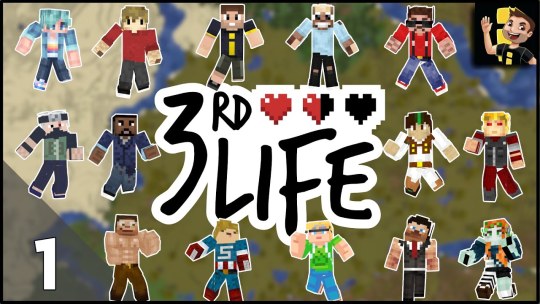
WARNING: Extremely long post
Kachow what’s poppin fellas, I’m back at it again talking about boomer block Youtubers and their surprisingly in-depth improv series. Now that the Life Series’ 5th season has finally concluded, I’m back on the lore train and poor Scar is left to suffer the consequences, and Martyn’s concluded yet another lore stream, I decided to compile a long master post of lore notes and theories about what we have so far.
Obviously all the ‘lore’ of the Life Series is purely unofficial; Grian has not approved any of it as being actually official/set in stone for what he intended the series to be. Most of it has been us in the crazy fandom extrapolating their really good storytelling, and also “semi-canonized” by Martyn in what he calls the Eyes and Ears AU (and this post assumes you are familiar with it). As someone who’s been a fan since the beginning way back in 3rd Life, I’ve pretty much hopped on the lore train since the beginning as well (if casually) and enjoying all the different extrapolations/analysis/angst written around the players. Rather than just theorizing lore details in a vacuum, however, I’ve always liked imagining the lore based around the reoccurring themes, symbolism and arcs we’ve seen across the series. I’d been bouncing my various thoughts and theories around these themes for a while, and finally I decided to compile my notes together.
This post is basically my imagining what the Life Series/Eyes and Ears AU story is “about,” as if it were a fleshed-out, long-running and story-driven tv show. Initially this post started as simply a gigantic “Eyes and Ears Theory,” me trying to sus out my own theories/ideas of what the Life Series’ mysteries were based on Martyn’s lore. However, considering that Martyn is ALSO writing the lore on the fly, and I have some details I would interpret differently or change, this ended up less a ‘theory’ and more ‘me writing an entire AU/interpretation of the Life Series as a whole.’ My intention is NOT to ‘correct’ Martyn’s lore, nor to claim my theory as the ‘right’ interpretation; rather, this is my personal interpretation of what the Life Series story is about, based on information shown in the original SMP and in Martyn’s AU.
One last disclaimer: I am ONLY drawing on lore details from the Life Series, Martyn’s lore streams, and Minecraft EVO, and also references to the iRL creators. I am not drawing on any story from other SMPs such as Pirates or Empires; there may be some Hermitcraft references here and there.
This is going to be very long, and a multi-parter, because I can’t summarize to save my life. And I promise I’ll come up with a proper name for my series of posts another time. If you’ve stuck around to read, I thank you.
Part 1: The Overall Plot + Understanding the Watchers
Recap of official lore details
Although Martyn hasn’t given specific details on the Watcher + Listener species (he hasn’t come up with a name yet), we know the following details for sure (from EVO, lore streams etc.)
Watchers + Listeners + The Council are all deity-like beings of the same species, and they all consume human emotions
The Council are the upper ranks/possibly leaders, whereas the Watchers + Listeners are separate factions
The Watchers are at LEAST two high-ranking members of the species (the two dots being outcast from the wider circle, as is their logo)
The Watchers were behind Minecraft EVO, where they gave all the players tasks (much like Secret Life) and eventually ending in them fighting the Ender Dragon separately
While the Watchers may not have been evil in EVO, they certainly became so AFTER, when they began to crave more negative human emotions, viewing them as “tasty” (Martyn’s words), s p i c y
They first kidnapped Grian at the end of EVO season 1, turning him into a Watcher to possibly have him join their ranks, but he’s gone rogue after realizing what their plans for the Life Series were, and plans to rescue his friends from them
The Life Series was the Watchers’ ploy to trap the players in an infinite death game where they betray and cause each other pain, all to harvest their negative emotions. Grian, in defiance to this, takes control as the ‘game master’ to make the whole thing…well, a game, so that his friends can enjoy, have fun and ease their anguish. In Martyn’s words, this is like “pouring ketchup all over the Watchers’ sundae.”
The Listeners (EVO season 2) are an opposing faction to the Watchers who disagree with their methods, although why is unknown. They’ve attempted to contact some players (e.g. Jimmy) before back in EVO in order to oppose the Watchers, but it’s not known how successful they were. They’ve also tried to swap in players in the Life Series before (e.g. subbing Lizzie and Gem for Pearl and Cleo in Lim. Life) in order to sneak them in and try to subvert the game. The Watchers kidnapping Gem for Secret Life is partially in retaliation to the Listeners. The Listeners may not be good and may have nefarious intentions also, it is as yet still unknown.
There’s potentially a third faction, the Speakers, but very little is known about them and Martyn doesn’t want to elaborate on them yet.
Okay, but what are the Watchers even after?
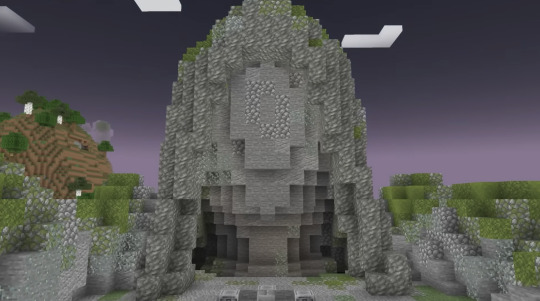
"Accept your fate."
From here on out is my real conjecturing/theorizing. The main question on my mind has been why are the Watchers doing what they’re doing? Obviously Martyn has confirmed that they are malicious deities who find negative human emotions tasty, but this raises further questions. Why exactly do they desire such emotions, or need them to survive (if they do, anyway)? Why do they favour negativity, when the other members of their species consume a wide range of emotions? They were confirmed to be outcast in some way from the other factions for this ploy, so what does that say about them then?
The whole species fundamentally do not understand human emotions (or perhaps do not even possess them)
This seems to me the most logical conclusion. These are powerful deities who can create miniature worlds/dimensions, life, and time to an extent (death loop). They should theoretically be self-sufficient, so I doubt that their consumption of human emotion is for survivability reasons (i.e. I don’t think Watchers will literally die if they don’t consume emotions, the same way humans die without food). What seems more likely is that human emotions bring them some benefit to their intelligence or power that they’d otherwise be quite non-functional without. (Think like the demons in The Promised Neverland, who regress to feral natures/lack of sapience if they don’t eat humans)
The Watchers’ powers and their lab-rat experimentation on the players gives a huge vibe of not being able to understand human emotions in an involved way, but only from a distance. They know methodically things like murder and betrayal cause panic and anguish, so they enforce these experiences through the game, mechanics like the Boogeyman, the Secret Tasks etc. But they don’t really know internally why these emotions come about the way humans do. Being above time, they probably don’t understand why the funny small animals have so much attachment to their transitory experiences and memories (more on this later).

world's angriest pumpkin
The Watchers are Losers, Actually
Going further, don’t you think the Watchers have a very misanthropic mindset all around? “Anguish and panic are s p i c y.” They conversely have a complete disgust for positive emotions, and can’t stand Grian making things fun for everybody. It almost feels like they have the mindset that only things like hatred and fear are exciting, bringing motivation and life to the humans, whereas things like happiness and fun are ‘useless’ because they don’t bring about the same results. Let’s also not forget their name – Watchers – and that Martyn’s confirmed them to be symbolically based off us, the audience. It’s almost like a commentary of the worst of the entertainment industry, of an audience who crave watching anything and everything to satisfy their own desires, even at the expense of the privacy and safety of the entertainer. Given the current state of the internet and social media, I don’t think I need to elaborate how awful things can get.
In other words, I believe the main motivation the Watchers are eating humans emotions is because they WANT to understand and ‘take into themselves’ such emotions. I don’t think they’re totally emotionless – Martyn does portray them with moments of glee and anger. But their understanding of emotions is superficial (self-centered, if you will) at best. As deities with no needs, being above time, they have nothing to be afraid of and nothing to feel sad or anguished over. It’s a boring, dull and empty existence. And that’s precisely why they’ve set up the Life Series game: by kidnapping a few humans and putting them through the artificially constructed wringer of panic and betrayal, they think they can create a human farm of such rich, complex and exciting emotions, all for themselves to enjoy at their own pleasure and fill the void they have.
(Listeners’ side note: If all that is the philosophy of the Watchers, it’s probably not difficult to see how/why the Listeners oppose them. The Listeners likely disagree that negative emotions are the most optimal state of humans, and unlike the Watchers do not think human suffering is just tasty popcorn one can eat at one’s pleasure. Their name – Listeners – implies they’re a more sympathetic faction, as in they listen to one’s troubles and heart rather than take delight in suffering at a superficial level. But if they are the same species, it’s very likely they have the same lack of instinctive understanding of human emotions that the Watchers do, and this could cause…problems.)
Why turn Grian?
All this is also why I believe the Watchers kidnapped Grian + turned him into a Watcher in the first place. Firstly, if they were going to concoct their plan to trap humans, they needed a collaborator from the humans in the first place. Secondly, and most importantly, this collaborator was going to be their only direct source of how human emotions work/feel like, and therefore what were the most optimal conditions needed to ensure their death game would generate the most pain and anguish. They picked Grian because he’s always the ‘leader’ of the SMP players, the person gathering and organizing everyone, so logically, he is the most ‘representative’ of the humans, and the one with the greatest ability to control them.
Of course, it’s also true that Grian was a little $#@% throughout EVO and actively rebelled against the Watchers’ tasks, so making him their collaborator might seem strange. Ignoring the meta reason that the ending was written to explain Grian’s exit from the series. But I figured in this case, they considered the benefits more than the costs. Grian’s chaotic nature is not unlike the Watchers’, considering how much he loves causing pranks and trouble to others. So, as a huge oversight, they think Grian is just like them: he loves to see people suffer, so they think. Additionally, the Watchers are desperate to understand how Grian gets his fellow humans to follow him and do what he asks with little effort. You’ll notice the Watchers have very direct, authoritative ways of trying to wrest control (e.g. the tasks, “do this or you fail”), and they get very petty and upset when people rebel against them (re: Scott’s refusal to be the Boogeyman, their motto is a very demanding “OUR WILL BE DONE.”) They see Grian’s charisma as yet another aspect of human emotions they fail to understand and thus WANT to possess for themselves.
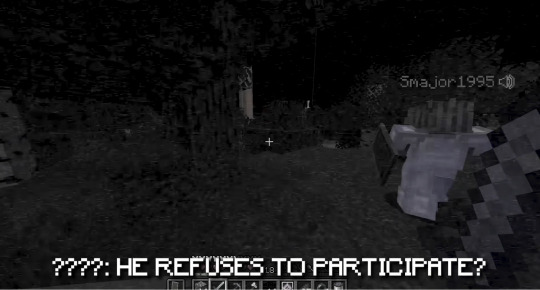


Pictured above: The Watchers, coping and seething
Of course as we know, the Watchers believing Grian would help them is a major oversight. Becoming a god doesn’t just fundamentally change who Grian is, and he definitely doesn’t want to consign his friends to an infinite death loop of suffering. That being said, I don’t think Grianhas truly gone ‘rogue’ so much as taken as much advantage as possible of his ‘deal’ with the Watchers. We can guess the Watchers promised to him some kind of control/leadership over his friends’ circumstances as long as he worked for them, which led to them giving him the keys to the Life Series. In other words, so long as he fulfils their requirements of things being a death game that will generate ‘food’ for them, and lets them revive everyone each loop, he gets to decide how the games go.
And we know exactly what Grian’s done with this: he created the green-yellow-red lives system, he creates a fun gimmick each season, he inserts himself into the game as a player, all to bring out the best and most creative side of his friends rather than the worst. The Boogeyman probably is the only gimmick the Watchers added on their own initiative (re: Martyn’s POV in Last Life) in order to make things more spicy. Probably Grian’s conversation with the Watchers each time goes, “hey, I got an idea on how to bring out the most creative ways for everyone to cause pain in each other, [comes up with some bullcrap justification for the game’s fun mechanics].” I like to think the Watchers were going to make the death games even more vicious, cruel and competitive, but because of Grian’s wrangling he’s convinced them that a slow burn from joy to horror creates better results, and they tolerate it as long as they see him useful.
Memories and Emotions
There is also one BIG detail of the Watchers’ plan I’d like to mention: Martyn claims that the Watchers do NOT erase the players’ memories. At the end of each season, they consume everyone’s emotions so that there’s no more angst/ill will towards each other, and they start each season afresh. The players remember what’s happened in past seasons, but they don’t continue to hold the pain and negative feelings they had towards each other.
I don’t buy this, for numerous reasons.
For one, Martyn has confirmed the Watchers ARE capable of removing people’s memories. The one memory they have outright altered was the ex-EVO players’ (Martyn, Jimmy, BigB etc.) memory of what happened to Grian: they don’t remember that Grian was taken to be turned into a Watcher, and instead remember it as him either going missing or dying after the Ender Dragon fight. All this presumably to not give away the Watchers’ schemes and to ensure they still listen to Grian as if nothing ever happened.
More importantly, however, memories are vital to humanity’s emotional experience and mental health. I am not an expert by any means, but there are studies showing how people with amnesia, PTSD or other conditions affecting memories have flashbacks/emotional reactions to trauma they don’t remember consciously. The Watchers have (supposedly) done something far more simplistic yet fantastic by just eating up everybody’s emotions. All this, even though they see humans as emotion factories, constantly able to generate emotions just by existing, by their ability to draw and create meaning through emotional experiences, and by creating memories – the clearest embodiment of a mortal’s attachment to time (which if you remember, I believe the Watchers have no concept of).
You cannot just tell a human to stop feelingcompletely (under normal circumstances anyway), but especially not if they remember something very very traumatic.
Besides, there ARE clear instances when some of the players remember the events of past seasons and are STILL not over them! Impulse and Tango still being bitter/distrustful after Bdubs betrayed each of them separately, Cleo distrusting BigB for the same reason, Scott referencing Flower Husbands a lot, Pearl feeling betrayed by Cleo/Scott when they supposedly broke up the Gaslight/Gatekeep/Girlboss trio at the start of DL, Bdubs’ “I wanna be your favorite son” in Secret Life, the list goes on. Note that I’ve only listed negative/bittersweet instances; there are plenty more cases of the players remembering past seasons and alliances positively which the Watchers may have ignored. The point is, if the Watchers truly consumed everyone’s emotions to the point of a clean slate, they haven’t exactly been thorough. Nor do I think it’s very conducive for them either – don’t they want players to have enduring, unending, unresolved pain, the sweetest of all (to them)?
No, I think the Watchers HAVE been erasing/suppressing the players’ memories – they’ve just been very selective which ones. Martyn’s said that the Watchers do not care what families or connections they separate so long as they get the people they want and the plans they want. I’m going to assume the players in my theory/the Eyes and Ears AU are exactly the same as their CC counterparts. In other words: they’ve stolen Grian away from his wife. They stole Martyn away from his and his daughter. Ditto with Skizz, Impulse, Tango etc. They stole Scar away from his family. Joel and Lizzie are the only couple they didn’t separate, perhaps because they needed both for their plans, and also so they can inflict the most torture on them by ripping them away from each other, over and over again. And in order to ensure the complete submissiveness of the players to the game, the Watchers have taken away their memories of their past lives, their families, basically anyone who isn’t a fellow player in the game. The Watchers don’t erase the memories of bonds between seasons, because it’s a pain to have to teach the humans how to play all over again, but they erase any memories they find disadvantageous to keeping the game running.
They might even go one step further: while they haven’t erased the players’ memories of who each other are (so as to not cause confusion), they do try to suppress important memories. Things like how they met, the times they confided in each other after a bad day, cried on each other’s shoulder, laughed in each other’s successes, the times they hung out with each other’s families. Imagine the different alliances constantly gravitating to each other, but never being able to remember why they care about each other so much. Imagine Bdubs’ “Come on, you know you and I go way back!” when trying to justify taking Cleo’s stuff, and Cleo laughs back, even though she can’t quite remember what exactly Bdubs has done to warrant that. Imagine Joel or Lizzie trying to remember why they loved each other so much.
They fight and kill some of their friends, and protect others, because…because why again? It’s for survival value, surely, so the Watchers whisper. It’s because the strong must congregate with the strong and leave the weak to die, surely. It’s because Martyn’s always been a loner, and always will be, and should remain so. So they tell him. So they whisper, this is a deathmatch for a reason.
Grian’s Fundamental Rebellion
I think all this is the real reason Grian is rebelling against the Watchers. The most immediate reason is obvious: he wants to free his friends from this death loop. But the deeper reason as to why he’s rebelled is that the Watchers are torturing and robbing his friends of their humanity. They’re taking a tight-knit group of friends who love and would do anything for each other, and turning them against each other in a cruel and unescapable death game. On TOP of this, the Watchers have constantly messed with their heads in order to make them obedient and submissive to their schemes and the worst of their human nature, trapping them in fear, pettiness and paranoia. Of course Grian is upset. Of course he wants to save them from this fate. It’s an insult to who he knows these people to be.
This all leaves Grian in a pretty precarious position. While outwardly the Watchers want to make him a lackey as the “game master”, both he and they know he really wants to save his friends (they probably see it as their ‘cattle’ showing a bit of resistance, which once again they need to suppress). And while on one hand he’s making the games fun to ease his friends’ pain and bring the best out of them, this is just a hotfix rather than a real solution. In order to really rescue the players, Grian’s got to get them to rebel against the Watchers as well. Refuse to play by the rules, by the expectation that they must murder and kill without mercy, without any attachment to their alliances or past friendships. Make everyone like Scott refusing to be the Boogeyman, or Skizz constantly trying to be wholesome (until the bloodlust gets the better of him anyway).
Ironically in order to achieve this, Grian’s best bet is to try to jog everyone’s lost memories of each other and the things they lost, both good and bad. But ultimately, this is going to make them (in the short term) suffer more. This is where you can insert all your Desert Duo/Flower Husband/whatever alliance you like most angst. But more practically, I like to imagine when “the cameras” are not watching, when Grian knows no one will notice or catch him, he sneaks around to the different alliances, even the ones he’s not part of, to ask them how they’re doing, if they remember anything from the past etc. (in a meta sense, the players edit and cut stuff from their videos all the time; who’s to say he isn’t trying to catch a quick chat while everyone’s mining?!) It also reflects in why Grian is constantly trying to make alliances with different people instead of just gravitate to one person, he needs to check on everyone and capitalize on every single opportunity. (besides the meta reason, being that cc!Grian wants to be creative, and sticking to the same person all the time isn’t very entertaining from a content creator perspective)
One last detail about the winners: I don’t have much to say about the fragments yet, because Martyn (sneaky boi) hasn’t yet revealed the significance of the fragments nor of their healing, although he has hinted Bad Things™ will happen if a player gets too fragmented. But I do think the winners are important: with the game finished, they give Grian a very short window of time to talk to one person directly, without Watcher interference. They’re always the last to be killed/swept away/revived by the Watchers, and I can imagine there’s a brief period of time when their souls are being transferred to The Void w/e where Grian can step in and interfere. In my theory, Grian passes on some sort of clue/push to the winners, as like a subtle message about what they can do to stand up to the Watchers. I’ll detail on what I think these individual messages were in part 2. Needless to say, 3rd Life was a traumatic experience for Grian for many reasons, but the nail in the coffin was the fact that he won, and therefore there was no way for him to pass a message onto anyone.
Conclusion
Hooooooo jeepers that was long @A@; Thank you so much for your patience reading this if you made it to the end, I really appreciate it. As I said, I’ve had these lore ideas bouncing in my head for a LONG time, and with the end of Secret Life I couldn’t get out of my head the different trends/symbolism that was popping out of an improv series. It honestly speaks a lot to how genius our favorite block dudes are at improv, that they can turn their improv nonsense into a coherent narrative. I really wanted to try my hand at fleshing out such a narrative, and with Martyn constantly drip-feeding lore to the fans, I had more than enough material to not just put out guesses but construct something a full XYZ. As I mentioned, I enjoy workshopping themes and characters a LOT more than just worldbuilding or “what if this or that” details in a vacuum, hence why I’ve written all that I have, so this was a fun exercise for me all around!
Next time in part 2 I talk about Character Development™, or character specific notes and details I’ve noticed and extrapolated from what we’ve seen of each individual player, as well as what their different arcs across the seasons mean for them within the lore. Stay tuned for another wordbarf!
Bonus list of works I was inspired by for this loredump:
Log Horizon
The Promised Neverland
Danganronpa (ironic as I’m not really a fan of this franchise, but the first game has an otherwise solid premise which I found really similar to the Life Series)
The Fate franchise (when Martyn asked “what’s Fate?” on the latest lore stream, let me tell you I couldn’t stop laughing; NO MARTYN DON’T GO INTO THE WEEB RABBIT HOLE)
Various amazing animatics from the Traffic fandom: Earth, Bang!, most of Melloz Heist’s works, and of course all the amazing fanart
Way too many conversations with my friends about fantasy species
#what have I done#trafficblr#traffic life#traffic smp#life series smp#life series#eyesandears#eyes and ears theory#inthelittlewood#thematic discussion#theorycrafting#3rd life smp#last life smp#double life smp#limited life smp#secret life smp#long post
101 notes
·
View notes
Text
National Workshop on Global Instruments on SALW control.

The UN Regional Centre for Peace and Disarmament in Asia and the Pacific (UNRCPD), in collaboration with the Ministry of Foreign Affairs of Nepal and the Armed Police Forces of Nepal, and civil society organizations, proposes to host a national workshop. The workshop will be organized as part of the EU-funded regional project aimed at supporting the implementation of the PoA, and will engage senior officials from key ministries such as the Ministry of Foreign Affairs (MoFA), Ministry of Home Affairs (MoHA), and Ministry of Defense (MoD), alongside parliamentarians and civil society representatives. The national workshop will focus on Global Instruments on SALW control, with a primary focus on the PoA and its ITI.
The workshop’s content will be structured to align with relevant actions outlined in the UN Secretary-General’s Agenda for Disarmament, ‘Securing our Future,’ as well as the goals and targets established within the 2030 Agenda for Sustainable Development, the New Agenda for Peace, and complementary frameworks such as the Women, Peace, and Security agenda and the Youth, Peace, and Security agenda. It will encompass expert presentations on global instruments for arms control and an analysis of national policy and regulatory frameworks. Drawing from international guidance such as the Modular Small Arms Control Implementation Compendium (MOSAIC) , the workshop will feature interactive exercises and focused discussions on key thematic areas.
Start Date: Sep 3 2024
End Date: Sep 5 2024
Location: Kathmandu, Nepal
Meeting Hosted By: UNRCPD, Ministry of Foreign Affairs and Armed Police Forces of Nepal
Meeting Supported By: The European Union
#Securing our Future#New Agenda for Peace#women peace security#youth peace security#Modular Small Arms Control Implementation Compendium#MOSAIC#Workshop#interactive exercises#thematic discussion#arms control#civil society representatives#unrcpd#United Nations Regional Centre for Peace and Disarmament in Asia and the Pacific#agenda 2030#Ministry of Foreign Affairs (MoFA)#Ministry of Home Affairs (MoHA)#Ministry of Defense (MoD)
0 notes
Text
i adore Maruki as a character because he's simultaneously the most relatable depressing character that will make you cry with empathy, and the goofiest wettest cat loser in the game like what do you mean youre a licensed therapist and your first response to trauma is to brainwash a girl, project ur relationship issues onto a 17 yr old boy, and then rule the world in a golden leotard? bro went from 0 to 100 so fast??? anyway he's like 30% of the reason why p5r works as well as it does
#maruki is so essential to why p5r works and im so serious about that#i should do a post one day just deep diving into what makes him the best antagonist. like narratively and thematically#maruki 10000% projected his life story onto joker#he called joker the light guiding his research and then his treasure is a torch?#he discussed his trauma at not being able to save rumi right before tempting joker to save akechi?#guys i think the therapist needs therapy#also he's so funny#remember when he sprinkled salt trying to act cool and then it blew in everyone's faces and stung a bunch of students#i love reading fics w him because its a toss-up#some of them call him out for being an insane world-dominating manipulator (valid)#and in some of them hes like the phantom thieves' weird neighbor that they invite sometimes bc he brings nice snacks (also valid)#i love it guys maruki the gift that keeps giving#persona 5#my post#persona 5 royal#p5#p5r#maruki takuto#takuto maruki#shuake#phantom thieves#akira kurusu#sumire yoshizawa#p5r maruki
398 notes
·
View notes
Text
of course you can read necros and cavs as a parallel to the gender binary bc A) you can do whatever you want forever and B) yeah there's plenty of textual evidence comparing the necro-cav bond to a marriage. however one thing i think many of these discussions keep missing is the fact that most people in the nine houses are not necros or cavs and do in fact exist outside of this binary. which would make it. not really much of a binary
#get ur warm takes here#i know other people have said this already but i really feel like this binary idea has proliferated recently#but i get it i mean in the books we have almost zero exposure to House citizens living outside this 'binary'#so it is a binary in the sense that you can apply it to our major characters who are from the nine houses#but i'm just not sure about extrapolating it to the whole fictional society#i do think there are comparisons to be drawn here i just don't think enough discussions account for this third group being most of#the population.#like do a thematic analysis for sure but personally i would stop short of saying 'joh created a new gender binary and forced everyone into#it' bc. what about all those other offscreen characters who are neither necro nor cav#the locked tomb#nonasbirthday
1K notes
·
View notes
Text
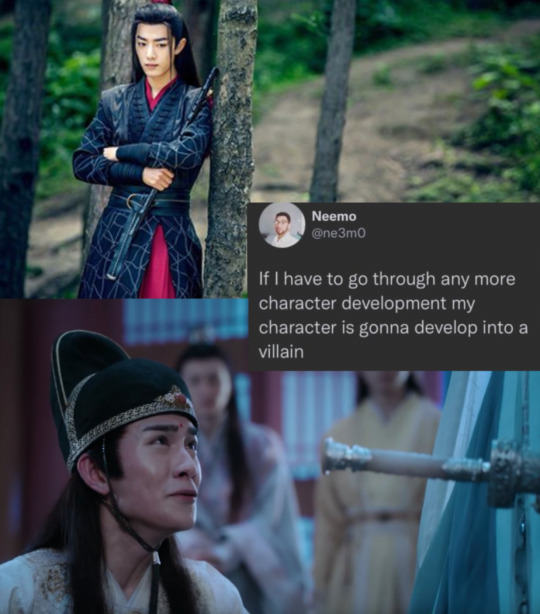
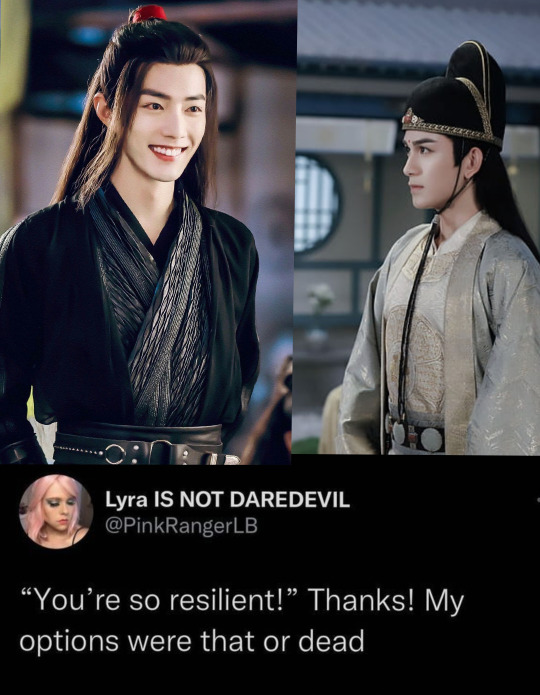
Am I obsessed with their narrative parallels? Who can say ¯\_(ツ)_/¯
#my friend and i were discussing the book being a split narrative between two perspectives and we both agreed#that jgy would have the most thematically resonant and narrativly interesting contributions#jgy#jin guangyao#cql#the untamed#wei wuxian#as always sorry if its been done before#i have the memory of a thing that cant remember anythign
992 notes
·
View notes
Text

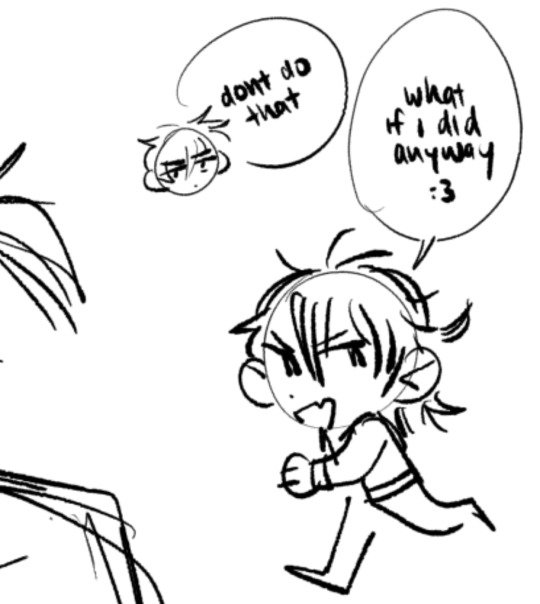
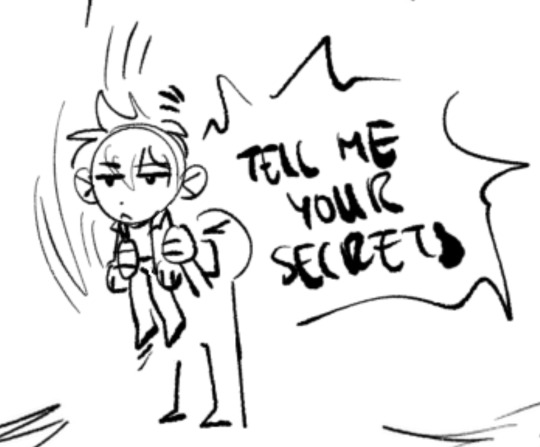

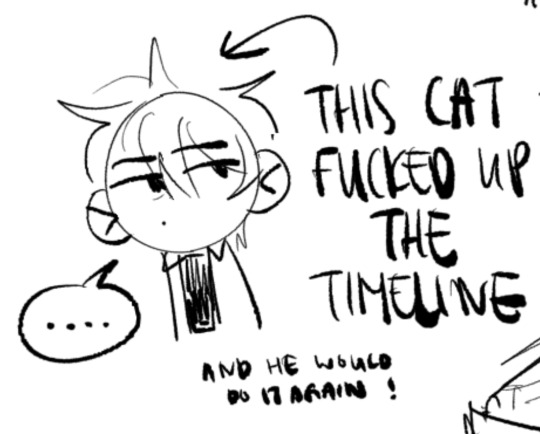

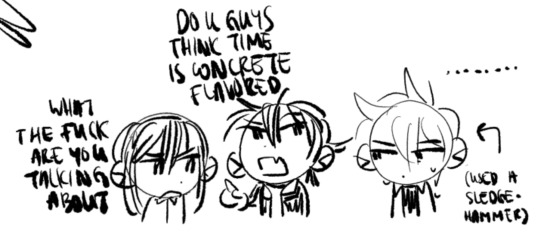


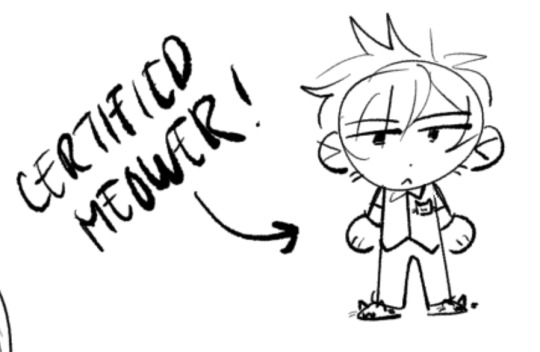

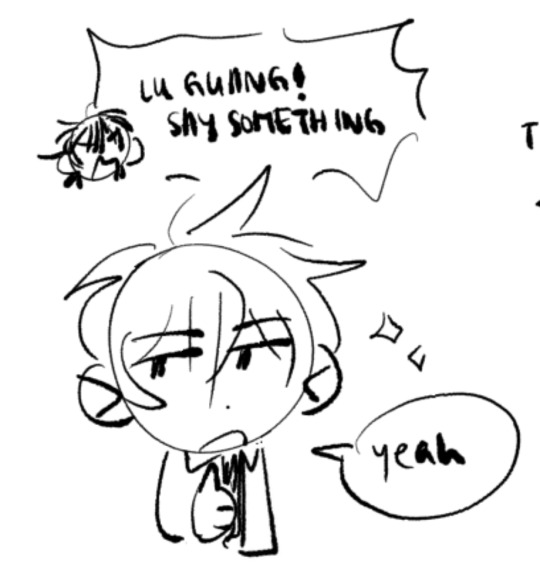
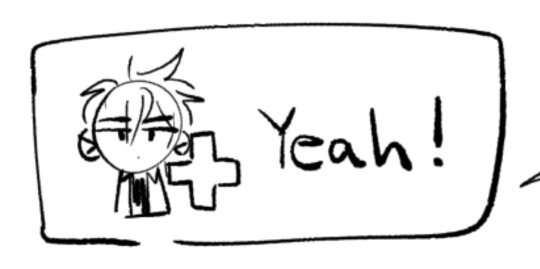

low quality link click doodle dump
#id in alt text#my art#link click#link click spoilers#时光代理人#lu guang#cheng xiaoshi#qiao ling#li tianchen#liu xiao#photo squad#squinky collection#every time i try to draw them normally i have another funny thought and i fill the whole canvas with these sorts of things#so heres all of them that ive done so far :]#lu guang in particular is very very fun to squinkify. his -_- meower swag#“concrete-flavored time” is referencing a discussion duckthedoof and i are having about whether time travel in link click is dominated by#the butterfly effect or by stable time loops. and dr who waters of mars is just because well dr who tries to rewrite time to save someone#and it goes badly. thematically relevant
88 notes
·
View notes
Text
An analysis of Alhaitham's egoism in relation to Kaveh
(Update: The essay this is taken from is now uploaded! It can be accessed here and here as as a pdf <3)
Max Stirner's anarchist egoism is speculated to be the basis of Alhaitham's personal egoism, therefore I will be drawing upon Stirner's 'The Unique and Its Property' for this analysis.
Property and power are key principles within this philosophy. The egoist recognises himself as an individual, separate from the general collective of “humanity”, in which concepts such as freedom and property are governed to and over the people, for then the individual is not considered as such, rather they are a part of “humanity”, rather than a whole individual (Stirner, 170). This thinking is demonstrated within Alhaitham’s Story Quest, where he dismantles Siraj’s Hivemind by targeting individuals that compromised the Hive and reminding them of their own beliefs and preferences – the individual in themselves is a whole, and is not a “part” of a system (Stirner, 170).
In this, the egoist governs himself by what he owns and what he wants to own: “ownness is my whole essence and existence, it is myself. I am free from what I am rid of, owner of what I have in my power, what I control. I am at all times and under every circumstance my own”(Stirner, 106). This relates to the concept of freedom, which, for an egoist exists according to having the power to be free of something, for example, being freed of hunger, thirst, or societal expectations (Stirner, 105). This is reflected within Alhaitham’s description: “He lives free – free from the searching eyes of ordinary people,” but also extends to the power to own.
As power is considered something which the egoist owns, property then becomes something which the egoist exerts power over, and in this, can property be made use of by the egoist – all the while, the property remains an independent vessel (Stirner, 162). This is seen within Alhaitham’s view on his vision, in that it is “no more than a useful tool”, as it can be used to serve his own needs, and that since it in his possession, he has obtained it with his own power, it makes no difference to check on it as he continues to retain that power.
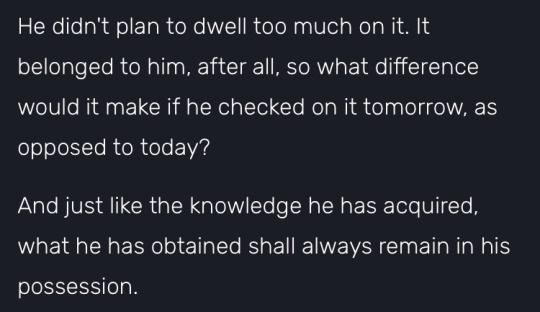
In this sense then, Alhaitham has constructed his life around this form of egoism, in that anything he wants, he has, such as his job as the Scribe, his house, the interests he pursues, the people he enjoys. In order to maintain this way of life, he will deal with, or be rid of, anything he deems as "harmful".

With this, the egoist seeks satisfaction in themselves through the satisfaction of another. Ownership, in relation to another person, can become love, which like all things the egoist has power over, is ultimately theirs – as in their love for a person (Stirner, 187), which is given willingly by the egoist, for loving a person is done for the satisfaction that love brings: “But I love them with the awareness of egoism; I love them because love makes me happy, I love because love is natural to me, it pleases me,” (186).
In loving another comes sacrifice, which the egoist can give into without compromising himself, as he himself sets the “purchase price of [his love]” (187) according to the happiness attributed to the loved one, as in return, the egoist shall also receive happiness (186). To enjoy someone, in an egoist fashion, is to be able to sacrifice all possessions and ownerships without foregoing the sense of an individual, of “ownness”, as the egoist would then lose his objectivity:
“I can deny myself countless things to heighten his pleasure, and I can risk for him what would be dearest to me without him, my life, my welfare, my freedom. Indeed, it forms my pleasure and happiness to feast on his pleasure and happiness. But me, myself I do not sacrifice to him, but rather remain an egoist and—enjoy him. If I sacrifice to him everything I would keep without my love for him, that is very easy… But if I sacrifice others to one passion, I still do not… sacrifice my particular worth, my ownness. Where this nasty incident occurs, love looks no better than any other passion that I blindly obey.” – The Unique and Its Property, 185
It is relevant to note that just as the egoist receives happiness from a loved one’s pleasure, so does an egoist suffer from a loved one’s despair. Just as the egoist would sacrifice something of their own to provide happiness for a loved one in order to exact their own happiness, so too would an egoist sacrifice something, or act, to eradicate the root problem of a loved one’s misery, as this, in turn, would then resolve their own misery:
“If I see the beloved suffering, I suffer with him, and I find no rest until I’ve tried everything to comfort and cheer him…. It doesn’t follow from this that the same thing causes suffering… his tooth gives him pain, but his pain gives me pain. But because I cannot bear the sorrowful crease on the beloved forehead, therefore, then for my sake, I kiss it away. If I didn’t love this person, he could go right on creasing his forehead, that wouldn’t trouble me; I’m only driving away my troubles. – The Unique and Its Property, 186
The phrasing of “driving away… troubles” is particular to note here, due to similar usages of language used within Alhaitham’s Character Stories, in relation to him acting in accordance with his self-governed rules and serving his own self-interest by: “[acting] on his own will and deals with anything that appears harmful in his eyes”.
Kaveh, however, interprets Alhaitham’s egoism as a detached, pragmatic view of humanity, in which the individual isolates themselves not only as a means of prioritisation, but by elevating oneself over others by refusal to intermingle and to cooperate for the benefit of others. Not only is this a harmful opposition to Kaveh’s view of individuals sharing their knowledge and talent in order to pursue a better society, but due to Kaveh’s experience of Alhaitham’s personal egoism, it is harmful to Kaveh personally. Kaveh refuses to prioritise himself over others because he has seen a negative consequence of egoism, in which he has been “cut to the quick” and it has ended one of the few stable relationships in his life.

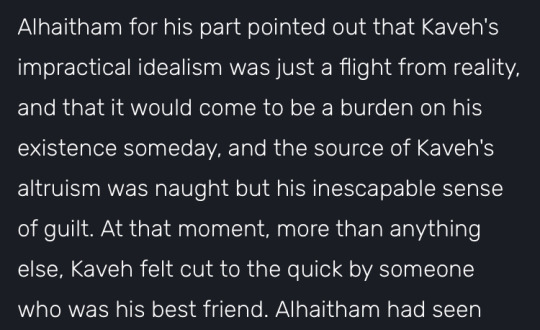
By Kaveh seeing Alhaitham’s comment about his altruism as malicious, Alhaitham has elevated himself over Kaveh, since Alhaitham does not have the same struggles as him, and has trivialised Kaveh’s trauma. To Kaveh, Alhaitham’s prioritisation of the self actively harms others as it desensitises the self to the emotions of others. Therefore, Kaveh opposes the egoism which Alhaitham advocates for, since he interprets it through his own lived experience. Hence, by Alhaitham asserting egoism over Kaveh as a means of Kaveh prioritising himself, it only reinforces Kaveh to strive to consider the feelings of others, as well as to not prioritise his own way of thinking if it undermines someone else’s.
In actuality, Alhaitham’s frustrations with Kaveh lie in his belief that Kaveh’s talents are incongruous with his values, and that if Kaveh were to prioritise himself, he would save himself suffering and enable himself to discover his “true self”, unrestricted by others placing labels onto him.
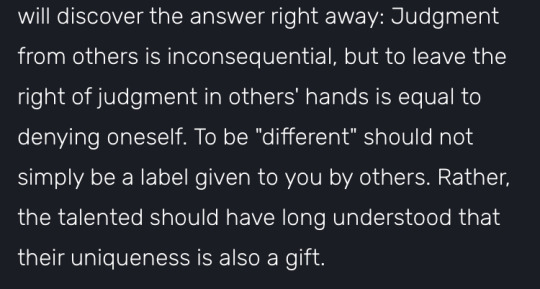
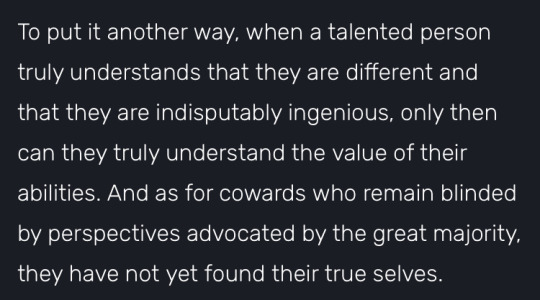
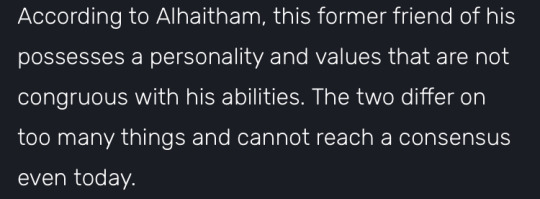

This is a personal frustration which Alhaitham would not compromise himself to assert onto a person he was indifferent to, due to his belief of not getting involved with other’s fates. However, he has been observed to ‘subvert’ his own rules to accommodate Kaveh. Through egoism, it can be seen that rather than ‘subverting’ these rules, Alhaitham adheres to them as an egoist, since he sees Kaveh as his mirror, they offer each other a contrasting perspective he believes they need to have a complete, objective vision of the world.
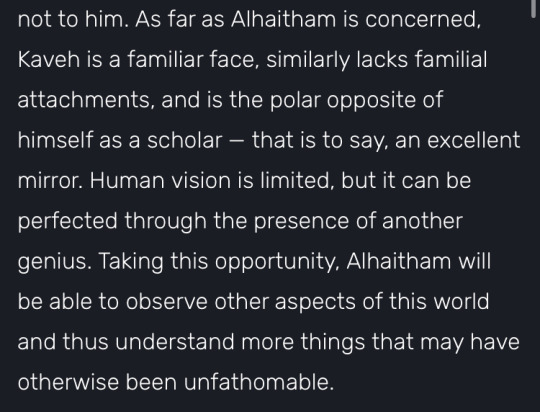
This is necessary for Alhaitham to consider within his own life, and therefore has extended his house to Kaveh, in order to expand his scope of thinking, and to consider perspectives he otherwise would not entertain. Kaveh’s ideals, his beliefs, and his philosophies explicitly interest Alhaitham, in contradiction with Kaveh believing that Alhaitham is disdainful of his perspectives.
In this way, Alhaitham enjoys Kaveh. He willingly pays for some of Kaveh’s tabs; pays for crates of wine for the two of them; and goes out of his way to pursue interactions with Kaveh. Just as Alhaitham is to Kaveh, Kaveh is an old friend, as unchanged in his beliefs as he was in the past and thus is a constant: “the most unshakable part of one's past is a friend that will never change”’.


Alhaitham strives to act in accordance to his own egoism and therefore assesses what “appears harmful” to him, in relation to these rules, so as to be rid of them. This can be extended to Kaveh, as Kaveh falls under what ‘belongs’ to Alhaitham, in the sense that ownership equates to Alhaitham’s enjoyment.
Alhaitham wants to have Kaveh in his life due to the alternate perspective which Kaveh offers him, thus expanding his horizons and granting him knowledge he otherwise would not obtain. As well as this, Kaveh is seen to be considered part of Alhaitham’s way of life that he wants to protect. In line with Stirner’s egoism, it follows that as Alhaitham enjoys Kaveh, as in, ‘owns’ the contentment Kaveh elicits, he therefore is affected by Kaveh’s self-inflicted grievances. Therefore, Alhaitham sees Kaveh’s altruism at the expense of his own wellbeing as something “harmful” to be dealt with, as this not only causes Kaveh inward misery, but also detriments Kaveh finding his “true self” (Alhaitham Character Story 3), which the egoist pursues above all else.
#i realised i hadn't actually discussed their philosophies in a post so here's an snippet from The Essay#kaveh's altruism is brushed over here but i didn't want this post getting too expansive oops#since their differences are the basis of the essay it's hard to filter that down into one post?#basically i'm aware that this reads as incomplete but i promise there is more where this came from!!!#also im reading that line: the two cannot reach a consensus even to this day#and im going insane because isn't that the resolution of their conflict? to find middle ground?#gee i wonder if that line is thematically crucial to their characters#also kaveh reads page 185 of the unique and its property and fights off a blush before denying everything#can they talk. please. im sick of them#the essay is coming along btw!!! thank you for all your thoughts and encouragement!!#haikaveh#alhaitham#kaveh#kavetham#haikaveh meta#genshin meta
133 notes
·
View notes
Note
Can we please hear your take on rosier twincest if youre into that i would inhale everything u write abt them
unfortunately i fundamentally don't see anything like that in the cards for the rosiers :(
to me, twincest is most thematically interesting when there's a push-pull between a pair's individual identities & their overriding Sameness (a great text for this is "Gothic Incest: Gender, Sexuality and Transgression" by Jenny Diplacidi (x) ) but the rosier twins' sameness is too complete for that conflict to exist. it wouldn't make sense because there is no tension; they are content to think of themselves as one person. you can't pine for yourself.
also like. i hesitate to make the rosiers overly transgressive. their codependence isn't exactly "normal", but their siblinghood is one of the most palatable things about them... it makes them easier to understand, which makes them easier for others to accept. their sibling bond is one of the few purely Good things in their lives, and i see it as redemptive for both of them..
essentially they are normal 100% of the time but the one person insane enough to get a tiny bit weird about it is bcj (💀). he met pandora, had the earth-shattering realization that There's Two Of Them, and then said absolutely nothing but a certain look came onto his face that caused reg to immediately go "YOU'RE FUCKING DISGUSTING" in the great hall.
#a#he just wants to separately date both of them at the same time#OKAY. I'M SCARED OF THIS FANDOM SO I FEEL THE NEED TO CLARIFY. i'm not like an 'incest shipper' or whatever#but it's interesting thematically in the context of gothic texts and is an unavoidable (even crucial) genre convention#and hp pureblood/wizarding world meta is at its best when treated like a gothic invention. the text is already steeped in it#so like... let's be scholarly about it for a second... we can discuss it & also be normal... it's literally fine......
89 notes
·
View notes
Text
its interesting to me that the common sentiment appears to be that han sooyoung intended for jang hayoung to be trans. I think there's room for multiple interpretations, but I view being trans in orv as being inherently tied to the themes of self-actualization, as well as the idea that a narrative is unable to be fully defined by either author or reader. put more simply, jang hayoung is trans regardless of either kim dokja OR han sooyoung's intentions in creating her, or in how they each interpreted her. maybe the version of her in the novel was meant to be something else, but in the reality of this world, she is a trans girl. han sooyoung's intentions kind of don't matter there because the text has moved beyond its author
#narrates#orv#orv spoilers#i guess its like. its not Incorrect that kim dokja misinterprets her (this is a major part of their interactions obviously)#but the assumption seems to be that hes misinterpreted her all along and she was supposed to be trans. which. eh?#again i can see it but i like this reading a lot more#when i discuss characters paralleling kim dokja in some way it is always fully independent of my considering of hsys authorship btw#thats interesting for me to consider separately but i tend to just. enjoy parallels as parallels#as fun as it is to think about how hsys writing choices characterize her. i really like how deeply orv is influenced by death of the author#again it just feels more thematically appropriate to consider orv as a work created in a specific real world context#then to speculate on how writing comes from an author. as interesting as orv's in-text author legitimately is
96 notes
·
View notes
Note
do you think they borrow each other’s rogue names after they die
also as a rogue name for thalia, blue bolt? (blue eyes, ‘bolt from the blue’ being an idiom for unexpected and important news, and also meaning a lighting bolt far from the parent storm (this being because a charge of electricity was so strong that it wandered away from the parent storm)
blue bolt felt so deviantart oc-coded but hell yeah that’s the fun part
oh absolutely i think rogues would name themselves after each other. Even besides just adopting each other's names when one of them dies, but also like trading names. Best friend rogue duo whose rogue names are just each other's real names.
tbh Thalia and Luke would have deviantart oc-coded rogue names lol. Blue Bolt is definitely a cool fitting one! I was joking in the TA discord yesterday that Luke might lightheartedly call Thalia "Green Day" or "Hot Topic" just to tease her.
Still dunno what Thalia might call Luke though 🤔 Cause he's already a little jaded of the gods to begin with so he'd probably try to lean away from directly Hermes-related nicknames? But he's super emo so he'd probably try for something dramatic and edgy. And Thalia would probably tease him about it as much as he teases her.
#pjo#riordanverse#rogue demigods#thalia grace#luke castellan#Anonymous#ask#i do staunchly abide by Thalia's initial description giving her ''storm green eyes'' i do not accept the blue eyes retcon u_u#just cause i think ''storm green'' is more fun than electric blue for her and makes a fun parallel to Percy#especially with them both having green eyes but association with the color blue#(its also extra fun cause i give Nico hazel eyes so just all three of them have green-ish eyes lol)#also. storm green is just a REALLY cool color description and has cool thematic implications#cause storms that turn green are usually BIG storms or tornadoes#anyways thats my thalia eye color rant sorry for the tangent. i just think its interesting her eye color got retconned#cause most people dont remember her eyes were ever not blue. though tbh heterochromia thalia could also be very fun#anyways eye color discussion aside - i think Annabeth would just call them both by their real names#cause she wasnt really ever a true rogue unlike Luke and Thalia so she doesnt have the rogue culture context for why they do it#(cause of the ''names have power'' thing) and also she was. seven. she's not gonna be as consistent with using the nicknames.#and i do think rogues would have multiple rogue names cause they just kind of pick them up. a lot of them are probably epithetical#cause if the rogue demigods are wary of the names have power thing theyre gonna go old fashioned route. just describe 'em
43 notes
·
View notes
Text
It was Anthy all along; it was always her.
So I was picking raspberries and listening to another Utena rewatch/analysis podcast this morning (as one does), and had a revelation that blew my mind, something I hadn't put the pieces together before...
(spoilers below the cut because there's no way to talk about it without talking about all of it)
So they were reading the opening fairy tale on the podcast, the prince giving the ring to Utena, and this is what came to me:
We've always known that the prince is an illusion. Whatever Dios was, or represents, by the time they could meet Utena in childhood (in whatever sense time exists), there is no person there. To the extent that real things exist outside of Ohtori, I'd always read this as a projection of Akio, a facade of princeliness he puts on while trying to find another person who might be able to win his dueling game for him. After all, he's the one who claims to be a prince, to have been a prince, wanting to reclaim the power of Dios. He is the prince that Touga and Saionji knew, when they biked together to the church and saw Utena hiding in a coffin.
But we also know that who Utena saw in the church was Anthy, a little girl, hurting, that she couldn't help but reach out to.
And why should Akio be there? He has his world in Ohtori that he can't imagine leaving. He sends Anthy to do his work for him, borrowing the power of the Rose Bride since he no longer has the power of the Prince. We know Anthy goes into the world (as Miki and Kozue's new stepmother). We know Anthy is an illusion (you know *hand gestures at everything*, but also specifically Mamiya). Why shouldn't Utena have seen a shining eternal thing, a miracle, the power to revolutionize the world, and remember it as a prince? Why shouldn't she have accepted a ring from the Rose Bride, a promise that if she remains noble and true that they will meet again, and decide that she will be the prince for this bride herself?
And was it a good idea? To follow an illusion that doesn't exist? To be manipulated into a game she can't win? (To reach out a hand to someone caught in a trap?)
Dios has always been Anthy, for Utena.
#Utena#Revolutionary Girl Utena#spoilers#analysis#seriously don't read this until you've finished watching#because these are major thematic elements that you deserve to discover for yourself#(which took me 20+ years to put together?)#I'm sure it's been discussed before#like I'm vaguely embarrassed to write it out because it feels so obvious once I've seen it#but also I know it didn't occur to me because I won't be able to not see it this way now#something something heteronormativity is a hell of a drug#feel free to tell me if this makes any sense#or if you've known it all along#I just enjoy that there are new readings for me to discover still#Anthy
218 notes
·
View notes
Text
There’s a surprising number of people in the CR fandom that seem to think interest in an AU must derive from disappointment in canon, and it’s like. Wow. Not every AU is a fix-it.
Some AUs are break-its. Swaps of all kinds: gender, sexuality, status, background, backstory, race, nationality. Suspiciously specific genre setting. Modern AU. Coffee shop AU. Prohibition AU. Bad Guys AU. Those aren’t fixing something. Those are exploring characters and story themes in another light.
I’m writing a Molly Lives AU. Those who know me best already know the answer to this question: Am I writing this story because I wish Molly had not died?
Excitement about potential AUs or canon divergences in the animated series is not necessarily stemming from “I wish X had[n’t] happened in canon.” For me and many others, the core is “it would be so cool to see what the Critical Role cast would have done if X had[n’t] happened.” If you can’t appreciate the different between those, maybe stay in your lane.
#critical role#mighty nein animated#and to be clear: I’m excited for the series whether they stay on the rails or not#some divergence was expected anyway because C2 is hard to parse into seasons#and it’s fun to speculate what could be done#discussion of ‘what ifs’ is not a diss toward canon or the cast#there’s actually very little about the campaign that is absolutely vital to the final confrontation theme wise#it could have been handled in a multitude of ways and reached the same result and thematic messages#which is WHY c2 AUs can be so fascinating#it comes down to the characters#not the events#the events are just how we saw them change#I’d love to see the cast play with that with this bunch
21 notes
·
View notes
Text
2nd Meeting, 2024 Protocol V Meeting of Experts (CCW).
Convention on Certain Conventional Weapons – Protocol V Meeting of Experts.
Watch the 2nd Meeting, 2024 Protocol V Meeting of Experts (CCW)!

#victims assistance#unoda#united nations office at geneva#plenary meetings#conventional arms#register of conventional arms#armoured combat vehicles#combat helicopters#combat aircraft#warships#small arms and light weapons#landmines#cluster munitions#ammunition and artillery.#Arms Trade Treaty#thematic discussion#united nations office for disarmanent affairs#gichd
0 notes
Text
Something I appreciate about Hortus de Escapismo is how it portrays the Laterans and non-Laterans, especially in contrast to each other. Guide Ahead already gave us the angel ethnostate vs multi-racial heretics, which made for a pretty effective if blatant commentary on Laterano. And while it might seem Hortus is kind of repeating the same formula, I think it's got something subtler going on with interesting implications.
On one side we have the abbey's inhabitants: sankta, sarkaz and all other races--hell, even a seaborn for a moment. Are there cracks here and there? Of course, that's a whole plot point. But it can't be denied there is genuine camaraderie and self-sacrifice going on between these people who are simply trying to survive together (which is what makes those cracks all the more volatile).
Contrast this with the Laterans, who are dysfunctional as hell. Lemuen, Oren, Richele, and Spuria; I can't say I fully parsed everything happening between them on a moment-to-moment basis, but it was overall apparent that none of these people trust each other. Even though they're friends and classmates and colleagues, even though they're working for the good of the same state, even though they're sankta who can literally read each other's minds. There's just this constant mess of cahoots and conspiracy and treachery and bitter friction, and it takes the threat of an Innsmouth-Jonestown crossover event to get them to finally work together.
I thought it was a nice way to show more of Laterano's flaws. It's one of their core themes that they aren't as great as they say they are, but you'd think they would, at the least, have blessed harmony thanks to their literal hivemind. But evidently that isn't true either. And again, these are agents at the highest levels of the government. If they're this dysfunctional, what does that say for Laterano as a whole?
Which leads me into thinking about what the future of Laterano might have in store. I've seen some folks point out how these events have these greatly compelling premises that don't actually resolve any of the issues they bring up. Laterano only remains Laterano. And this is true! But I think it's intentional, setting up a slow burn of a regional conflict. The Lateran state is holding together, the status quo remains unchanged, the Law is content. But for how much longer? Guiding Ahead introduced us to the divide in Laterano on a broad level, the state vs heretics. Hortus de Escapismo shows the cracks within the state, narrowing in on individuals who nominally should be on the same side but aren't. The next logical narrative step would be seeing the state finally cracking apart from whatever looming danger the Law sainted Federico to deal with.
Some sort of schism, perhaps; that seems like the sort of existential threat that would directly threaten the Law's directive of preserving the Sankta. Law's awareness of it would also imply it's an internal threat, something festering in the hearts and minds of Sankta and thus one It's able to sense (at least that's what makes sense to me. We don't actually know how the Law works, so it could very well just have random magic prophetic abilities). And especially with the constant background pressure of trying to legitimize their Summit of Nations, what better way to drive that issue to the forefront by throwing Laterano into utter political chaos?
#arknights#a genuine schism would probably result in. so many fallen huh. would be interesting seeing laterano's community struggle with that#maybe the threat has something to do with the iberian church and seaborn? considering those were elements that appeared in hortus#and they were discussing a potential reconciliation between laterano and iberia too. reads like setup to me.#reaching out to iberia would be ripe for a widescale collision of ideologies that could lead to another schism#and for iberia it'd also be thematically relevant given their other estranged relationship w another glorious near mythical country#also i want to see the sankta face the seaborn. they're not so different if you think about it.#precursor tech hiveminds dedicated to the group's survival. one is hyperadaptive and ever spreading the other is conservative and insular.#so the ideological threat of a schism and the physical threat of the seaborn#...or maybe also the ideological threat of seaborn? they have their own church too after all#PAPAL SCHISM ARKNIGHTS EDITION. 3 POPES 3 POPES. LATERANO IBERIA WE MANY#oh uh and again a schism would result in so many fallen which could tie in the whole. yknow. thousand year race war w the sarkaz.#that's kinda super duper really important for laterano's themes#sorry i'm just writing a whole other post in these tags :P
62 notes
·
View notes
Text
i think there's something to be said about what exactly it means to be "non-human" in a story that is as much about humanity as wolf 359 is, where even the dear listeners are defined less by their own perspective and more by what they fail to understand and therefore reflect about the human perspective - to the point that they don't even have their own voices or faces or identities that aren't either given to them or taken from humans. they speak to humanity as a mirror.
even pryce and cutter are "very much humans" - pryce defined by her resentment of and desire to transcend its limitations, and cutter by his aspirations to redefine and create a "better" type of human - and find the idea that they might not be human laughable. it's interesting that they have distinctly transhumanist aspirations when their goal is the narrative opposite of common science fiction fears: that we will expand the definition of humanity so much that we'll lose whatever it is that makes us human. pryce and cutter's transhumanism narrows the definition of humanity to the worthy and the useful, as defined by them; "there will still be a humanity; it'll just be our humanity."
in direct opposition to that, i think it's meaningful that the show instead expands the definition of humanity in ways that include lovelace and hera, who in another show with different themes might be considered (in the descriptive, non-moralistic sense) non-human. i will always make a point of saying that personhood and humanity are two often-related but meaningfully distinct concepts, especially when talking about sci-fi and fantasy. i am talking about humanity.
the question of how hera identifies, and what social pressures influence that, is a complicated one. i've talked about it before and i will talk about again. what's important for the purposes of this post is that i think the show considers her fundamentally human. think about her role in shut up and listen - consider jacobi's lion example and the concept of different paradigms - that even things that are close to humans, comparatively speaking, understand the world in different ways. whatever differences hera may have from the others, it's primarily in experience, not fundamental understanding. she shares their emotions, their concerns, their values, their thought patterns. she has an appreciation for music, which the show considers a hallmark of humanity. she fits within the framework of humanity as the show defines and is, in her own words, left feeling "uneasy" about how difficult it might be to communicate with beings who don't. and it's significant that this takes place in shut up and listen, of all episodes, specifically because the way she is clearly and unambiguously included in the show's understanding of what it means to be human highlights the ways she and lovelace are othered by eiffel's careless comments that suggest otherwise.
(i don't want to get too into these details for this particular post, but it's worth noting that hera will refer to 'humans' as a category, often when she is upset and feeling isolated, but has never said that she 'isn't human' - she has never been upset that people are treating her 'too' human. i've seen it said about the line "you need to get it through your heads that what goes for you doesn't always go for me", but that's a frustration related to ability and safety, not identity. far more often, she will refer to herself in 'human' terms - referring idiomatically to experiences or body parts etc. that she doesn't literally have - and is upset primarily with comments referring to her status as an AI. it does not diminish how being an AI influences her perspective and experience, but again, so much of that is in terms of ability that it feels almost inseparable from a discussion about disability.)
lovelace's humanity and hera's humanity are so interlinked and directly paralleled in the text that i think it's impossible to really argue one of them is "not" human without making implications about the other. in desperate measures, lovelace tells kepler he's "not human" and he responds "you're hilarious. on a multitude of levels." later, defending lovelace against kepler's repeated dehumanization, hera very pointedly uses the phrase "that woman." in out of the loop, hera says she's never met anyone who "worked so hard at being inhuman" as jacobi, who says "what do you know about being human?" hera very emphatically responds, "i know plenty." later, defending hera against jacobi's repeated dehumanization, minkowski pointedly uses the phrase "that woman." with the care taken towards language and the way scenes and turns of phrase will parallel each other, that's not a coincidence. it might seem strange to have the "non-human" characters be the ones to express criticisms based on perceived "humanity" (something hera will do in other contexts as well - "we don't have funerals for animals" etc.) but in the broader context of the show, i think it's the point.
so, whether hera would ever call herself human, or be comfortable with that, is a complicated question for another time and depends on a lot of other factors. but wolf 359 is a show about humanity, it includes her within its definition of what it means to be human, and i wouldn't be comfortable definitively saying she's not human because of that. it can't be a neutral statement within the particular context of this show.
#wolf 359#w359#hera wolf 359#there are so many concepts here that could be posts on their own#but this is already too long. sorry.#i think it's also worth noting how often i see the discussion of hera and humanity conflated with the discussion of#whether hera would want a body and while i think there's some degree of influence in that. if she has human experiences without human form#there's something uniquely isolating about that that could influence her decision. BUT. the form she exists or doesn't exist in#is separate from whether the show includes her within its 'in group' of humanity. which thematically it does.#hera can be considered equally human without ever having any type of physical form. that's part of expanding the definition#and i think that's an important distinction.#anyway sorry i'm kind of passionate about this it just. doesn't quite sit right with me i guess#in a lot of cases i think it's important to acknowledge that non-human characters have different experiences from human ones and#a lot of science fiction will (or should) decentralize the human experience. but it's core to the themes of wolf 359. it's different.#i think hera is so interesting as a take on the 'human AI' character because. the mistake a lot of them make is having a character#'learn how to be human' and it feels patronizing. but hera is. a fundamentally human person who has been told she isn't#and internalized that. and i think that's much more complex and. well. human. i know she's just a fictional character but#i can't help but feel a little defensive sometimes#it's also part of a larger discussion but feeling inhuman is a not uncommon human experience. it is within those bounds
268 notes
·
View notes
Text
Weird Guard Behavior with Elphael/Haligtree/Malenia
So, in mysteries, there is a cliche about when "the dog doesn't bark."
The scenario in those stories is generally that something looks like a crime done by a stranger, but the guard dog didn't react to the presence of an unknown person. This is evidence in the story that the person was known to the dog and, thus, not a stranger.
Elden Ring has a similar thing going on with Malenia and the Haligtree, though a bit more complicated because the guard dog is a very simple thing. In cases where it's people instead of guard dogs, it's more a matter of, given what is established about the characters and/or factions, what would we expect given various details.
We have a general idea of their characterizations, and what the likely scenario is. So there's a few questions that are important to answer, to understand their behavior and work from that. First- do they know Miquella is gone? Second- what are they doing after they know that?
We have an answer to both.
Malenia knows Miquella is gone, as do the Haligtree soldiers. Malenia outright tells the player this information ("as I awaited his return") and her armor specifies that she was waiting for Miquella at the foot of the Haligtree. The quoted dialogue on her armor is specifically her consoling someone else and that Miquella "will keep his promise." The Haligtree soldier ashes, too, note that Miquella isn't there- that's why they're despairing.
A common idea in the fandom is that Malenia doesn't know Miquella is gone at all. Likewise, I've seen routine complains that the player cannot encounter Mohg before Malenia, then go to Malenia to tell her about Mohg and Miquella and getting her help to return Miquella to the Haligtree. This actively ignores that Malenia and the other people in the Haligtree all know Miquella is gone. (This taking off confuses me because Malenia outright tells the player that she's waiting for Miquella.)
We also know the other answer- what are they doing? They are waiting for him to get back. They are not searching for him, not even a little.
Haligtree soldiers are the only faction soldiers who are explicitly only found in the core of their structure- in Elphael. Godrick soldiers are found throughout Limgrave, Redmane soldiers are found throughout Caelid, Leyndell soldiers and knights are found in multiple places, etc. And Malenia remains at the foot of the tree, awaiting Miquella's return.
Likewise, they are guarding Elphael in such a strange way if they aren't guarding Miquella (and, again, they know he's gone). It's got some of the tightest security in the game in terms of how every possible path is a death trap that's absolute ass (that one stretch of Revenants at the bottom layer comes to mind) and/or a bunch of soldiers, along with them having multiple ballistae set up pointing at the paths someone would have to go down to get deeper into the Haligtree.
It seems that the Haligtree's guarding was intentional. For example, it's only after you defeat Malenia and the player tells Gideon that Miquella wasn't there that Gideon reveals that he heard the story that Miquella was cut out of the Haligtree. Gideon initially dismissed it and this is possibly why it's guarded like that- to hide that Miquella wasn't there.
My point is that the dog didn't bark. The Haligtree and Malenia did not react to Miquella being supposedly abducted, despite knowing he's gone, despite their continued loyalty to him. They instead expect him to return on his own.
#writing discussion#elden ring theory#elden ring#malenia blade of miquella#miquella the unalloyed#this is actually one of the major reasons why I'm so hesitant to drop the theory that Miquella and Mohg were working together#or that Miquella was using Mohg (though I'm less partial to that theory for thematic reasons esp. given some other details)#Mohg having lilies and helixes on his stuff one could chalk up to being weird and obsessive#but this guard stuff needs explanation that the predominant 'kidnapping' theory simply doesn't explain...
23 notes
·
View notes